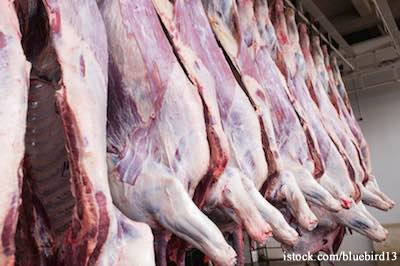The USDA’s Food Safety and Inspection Service (FSIS) has published a notice in the Federal Register, asking for comments about changes to its procedures for Salmonella sampling of raw beef products. FSIS is going to begin sampling for Salmonella in all raw beef that it collects for Shiga toxin-producing Escherichia coli (STEC) analysis. Deadline for comment submissions is September 27, 2013.
 The testing will be conducted on raw ground beef, beef manufacturing trimmings, bench trim, and other raw ground beef components. The analytic sample portion will increase from 25 grams to 325 grams.
The testing will be conducted on raw ground beef, beef manufacturing trimmings, bench trim, and other raw ground beef components. The analytic sample portion will increase from 25 grams to 325 grams.
In 2011, FSIS stopped sampling and testing for Salmonella in beef because positive findings were less than 1% and sampling is expensive. But now FSIS has selected Salmonella for the performance standard in beef testing because it is the most common cause of foodborne illness associated with meat and poultry products. The bacteria is present in all major species. And public health officials believe that efforts targeted at reducing Salmonella may help reduce contamination by other pathogenic bacteria.
Also in 2011, a multistate outbreak of Salmonella Typhimurium linked to ground beef sickened at least 50 people in nine states. The government believes that Salmonella in ground beef is a public health concern. By increasing the sample size and the number of establishments, public health officials think that FSIS’s ability to detect Salmonella in beef will improve. Increasing the sample size will increase the likelihood of detecting bacteria, since pathogenic bacteria can cluster and not be present throughout the product.
FSIS currently analyzes beef trimmings for E. coli O157:H7, and non-o157 STEC bacteria O26, O45, O103, O111, O121, and O145. But raw ground beef and raw ground beef components are only analyzed for E. coli O157:H7 at this time.




